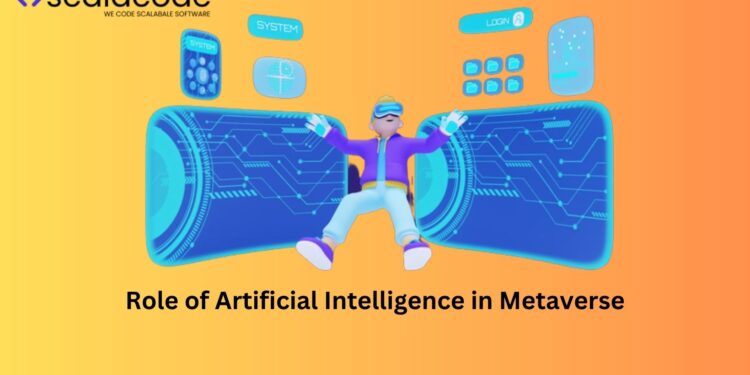We all are aware of the term AI. AI is almost everywhere. Whether you think of self-driving cars, personal assistants, or even robots, It is a rapidly growing field. This is significantly visible with its market size. As per recent stats by Next Move Strategy Consulting, the artificial intelligence sector will increase rapidly over the next decade.
Its current worth of roughly 100 billion US dollars is forecast to become more than double by 2030, reaching nearly two trillion US dollars. With that, it means, it’s worth hiring AI developers. Especially, nowadays, you can hire OpenAI developers or hire ChetGPT developers to get projects like ChetGPT chatbot development or any other AI development services.
Now when we talk about the Metaverse, it is a new tech word that is gaining the attention of people. People are curious about what it can bring to us.
But what do these terms actually mean? That must be the obvious question your mind may be floating around. So, without talking much let’s quickly dive into the topic- the role of AI in Metaverse.
Today, we will explore both concepts, provide a brief overview, and dive into the exciting possibilities that arise when AI and the Metaverse come together.
Let’s examine how their integration shapes the future of the web.
What is AI or Artificial Intelligence?
AI, an ever-evolving technology, exhibits remarkable capabilities in simulating human intelligence. It involves a range of techniques, codes, and algorithms that enable machines to perceive, learn, understand, and make decisions.
This transformative technology empowers AI systems to process vast amounts of data, recognize patterns, and extract valuable insights, fueling innovation across various industries.
What is the Metaverse?
The term Metaverse was first heard in science fiction. The author of that fiction was Neal Stephenson. In one of his novels called Snow Crash, there was talk of this word.
It represents a virtual universe where individuals interact within computer-generated environments. This virtual shared environment is created by the convergence of numerous emerging technologies such as AR, VR, Blockchain, and the Internet.
It is a multi-dimensional 3D space that transcends physical limitations, offering immersive experiences that blend the virtual and real world. It can let you engage in the activities like shopping, gaming, commencing, socializing, and many more just like you are doing in the real world.
The Metaverse, is a term gaining significant attention, but does it holds promise for the future? Will integrating this with another tech like AI make sense? If yes, what potential benefit will it have? You can easily get answers to this by taking a step like – hire Metaverse developers. Their experience and knowledge of Metaverse will be a great help.
Let’s explore their essence and discover the role of AI in the Metaverse.
AI in the Metaverse: What Role Will AI Play?
AI plays a crucial role in unlocking the full potential of the Metaverse, particularly when combined with technologies like Virtual reality, AR, and blockchain. There is numerous role of AI in the Metaverse that is worth considering. Some of the use cases are mentioned below:
Content Creation
AI empowers the Metaverse by automating the creation of captivating content, encompassing everything from 3D models and textures to dynamic animations. AI engines can analyze 2D user images or 3D images to create highly realistic avatars.
These avatars can imitate emotions, facial expressions, aging effects, and other features, enhancing the quality and dynamism of the user experience. Businesses with the help of a mobile app development company that are utilizing AI-driven tools have the power to:
accelerate the design process of virtual environments
slashing both the time and cost associated with content creation.
Big Brands like Gucci and Louis Vuitton are already leveraging AI for avatar creation in the Metaverse.
Digital Humans
Digital humans, built using AI technology, are 3D versions of chatbots in the Metaverse. They act as AI-enabled non-playing characters (NPCs) that can react and respond to users’ actions in VR worlds.
Digital humans have a wide range of applications, including NPCs in gameplay and automated assistants in VR workplaces. Companies like Soul Machines and Unreal Engine have made significant investments in this area.
Security:
Safeguarding the Metaverse presents an array of challenges, including identity theft, fraud, and cyber-attacks. Here, AI serves as a sentinel, diligently monitoring user behavior to swiftly detect any suspicious activity, be it
attempts to pilfer personal information
engage in malicious behavior.
Furthermore, AI’s unparalleled ability to analyze vast data troves and generate actionable insights aid the Metaverse’s overall security posture.
Real-time Translation:
AI empowers real-time translation of languages spoken within the Metaverse, facilitating seamless communication and collaboration among people from different countries. This paves the way for the emergence of a truly global virtual community.
Intelligent Environments:
AI algorithms actively simulate and generate stunningly realistic environments within the Metaverse. These algorithms dynamically create captivating weather patterns, implement lifelike physics, and bring intelligent objects to life, seamlessly responding to user interactions.
Through these intelligent environments, users can immerse themselves in a rich and interactive virtual world that mirrors the intricacies of the physical realm, fostering an unparalleled sense of engagement and realism.
Personalized Experiences:
AI algorithms diligently analyze user preferences, behavior, and historical data to craft personalized Metaverse experiences. By comprehending individual tastes, AI actively tailors the virtual environment, virtual objects, and interactions to perfectly align with users’ specific desires.
As users navigate a virtual world that not only caters to their interests but also closely connects with their individual interests and aspirations, this level of personalization promotes a profound sense of immersion.
Multilingual Accessibility:
AI plays a crucial role in language processing for digital humans. It can analyze and process natural languages like English, convert them into machine-readable formats, analyze the content, generate responses, and convert them back into the user’s preferred language.
This enables seamless multilingual communication in the Metaverse, allowing users from different parts of the world to access and interact with the virtual environment.
Wrap Up
AI and the Metaverse represent two transformative forces that are reshaping our digital landscape.
The integration of AI in the Metaverse amplifies its potential, enhancing user experiences, personalization, and immersion.
Therefore, as this integration progresses, we can expect the Metaverse to become an ever more captivating and dynamic space, offering limitless opportunities for entertainment, communication, and commerce.
The future of the web lies at the intersection of AI and the Metaverse, where innovation and imagination know no bounds. Therefore, if want to stay competitive, hire mobile app developers to help you in taking the next steps in the evolution of your business.


















